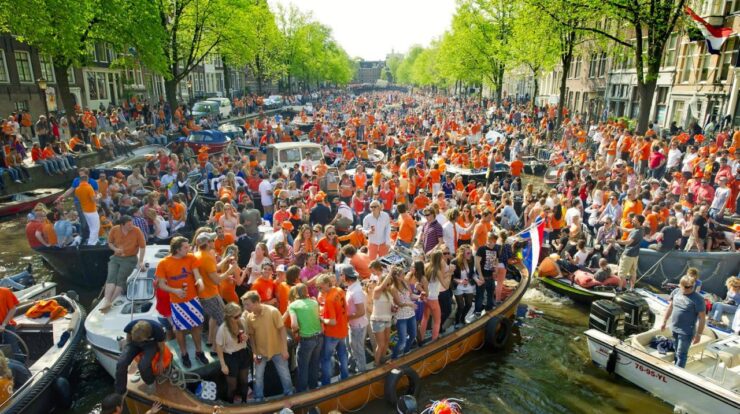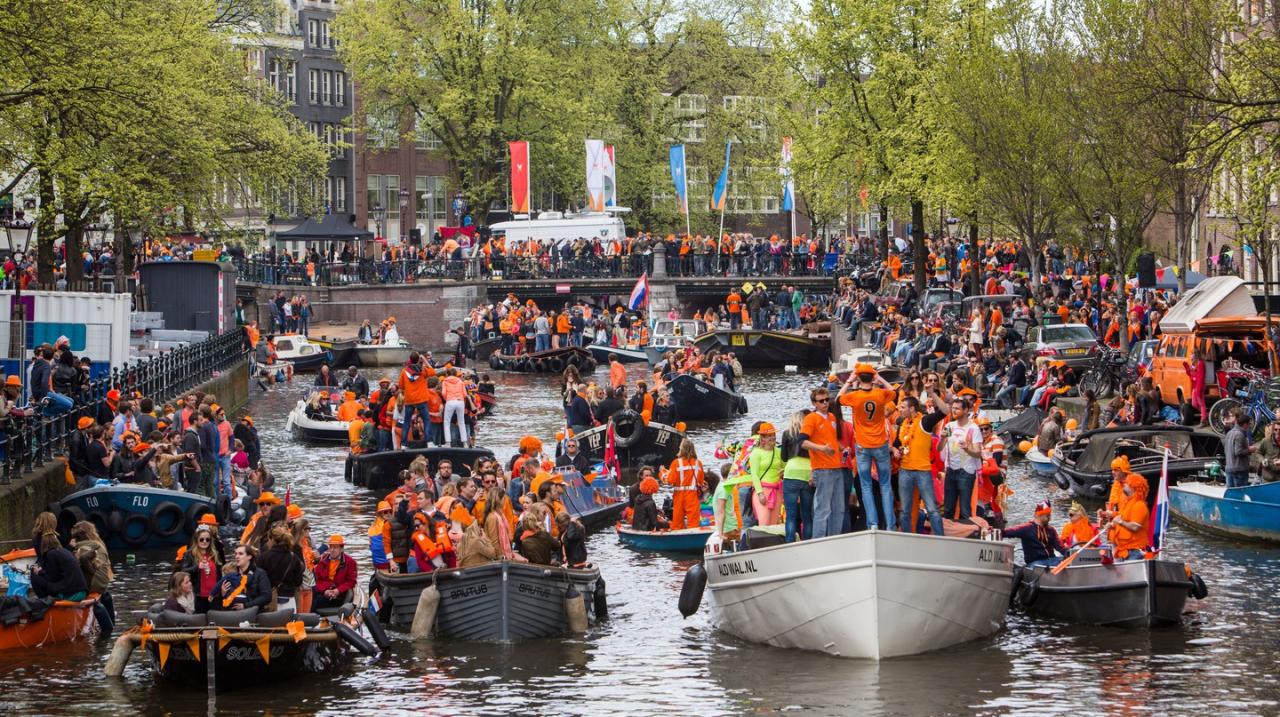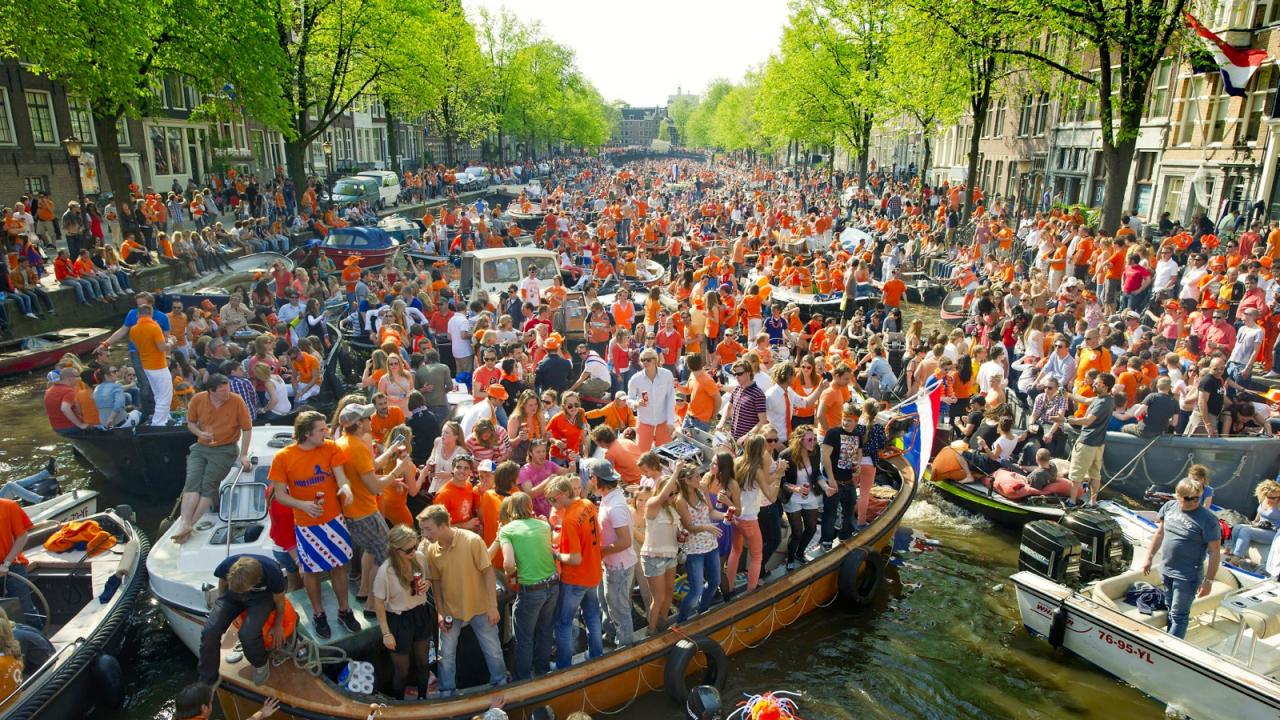
Kings Day Netherlands, a vibrant and beloved national holiday, offers a unique glimpse into the rich history, traditions, and spirit of the Dutch people. This day of festivities and revelry, rooted in the House of Orange-Nassau, has evolved over centuries to become a cherished symbol of Dutch identity.
From the lively flea markets and orange-clad revelers to the music-filled streets and special events, Kings Day is a day for the entire nation to come together in celebration. Its economic and cultural impact is undeniable, showcasing the Netherlands’ vibrant tourism industry and fostering a sense of unity among its citizens.
History and Origin: Kings Day Netherlands

King’s Day in the Netherlands has a rich history dating back centuries. The holiday originated in the 19th century as Queen’s Day, celebrating the birthday of Queen Wilhelmina.
The House of Orange-Nassau, the Dutch royal family, has played a significant role in the holiday’s development. Queen Wilhelmina’s reign marked a period of great prosperity and stability for the Netherlands, making her a beloved figure.
Traditions and Customs
King’s Day is celebrated with a variety of traditions and customs that have become synonymous with the holiday.
- Flea markets:On King’s Day, thousands of flea markets are set up across the country, where people can sell and trade their used goods.
- Orange-themed attire:Orange is the national color of the Netherlands, and on King’s Day, it’s everywhere. People dress up in orange clothing, hats, and accessories to show their support for the monarchy.
- Street parties:King’s Day is a time for celebration, and street parties are a major part of the festivities. Music, food, and drinks flow freely as people dance and sing in the streets.
These traditions symbolize the unity and joy that King’s Day brings to the Dutch people.
Festivities and Activities, Kings day netherlands
King’s Day is a day filled with festivities and activities for all ages.
- Music concerts:Major cities across the Netherlands host live music concerts featuring a wide range of genres, from pop and rock to classical and electronic.
- Parades:Parades are a common sight on King’s Day, with floats, marching bands, and dancers filling the streets.
- Special events:Many cities and towns organize special events for King’s Day, such as fireworks displays, boat races, and sporting competitions.
These festivities create a lively and vibrant atmosphere that makes King’s Day a truly unforgettable experience.
Economic and Cultural Impact
King’s Day has a significant economic and cultural impact on the Netherlands.
- Tourism:King’s Day attracts millions of tourists to the Netherlands, who come to experience the unique atmosphere and festivities.
- Retail sales:Businesses across the country see a boost in sales on King’s Day, as people take advantage of the flea markets and special offers.
- Cultural significance:King’s Day is a symbol of Dutch national identity and unity. It’s a day when people come together to celebrate their country and its monarchy.
The economic and cultural impact of King’s Day makes it one of the most important holidays in the Netherlands.
Global Recognition and Influence
King’s Day has gained global recognition and influence in recent years.
- Celebrations in other countries:King’s Day is now celebrated in several other countries, including Canada, the United States, and Japan.
- Media coverage:International media outlets often cover King’s Day, showcasing the unique and festive atmosphere.
- Cultural exchange:King’s Day has become a platform for cultural exchange, as people from around the world come together to experience Dutch traditions and customs.
The global recognition and influence of King’s Day is a testament to its enduring appeal.
Evolution and Future
King’s Day has evolved over time, with new traditions and customs emerging.
- Digital flea markets:In recent years, digital flea markets have become popular, allowing people to sell and trade goods online.
- Sustainable celebrations:There is a growing emphasis on sustainable celebrations, with many cities and towns implementing measures to reduce waste and pollution.
- Future trends:As King’s Day continues to evolve, it’s likely that we will see even more innovative and sustainable ways to celebrate.
The future of King’s Day is bright, as it continues to adapt to changing times while remaining a beloved tradition for the Dutch people.
Concluding Remarks

Kings Day Netherlands continues to evolve, reflecting the changing times while preserving its core traditions. As it looks towards the future, this beloved holiday promises to remain a cherished symbol of Dutch heritage and a vibrant celebration of national pride.
FAQ Guide
When is Kings Day celebrated?
Kings Day is celebrated on April 27th each year, the birthday of King Willem-Alexander.
What is the significance of the color orange on Kings Day?
Orange is the national color of the Netherlands and is associated with the House of Orange-Nassau, the royal family of the Netherlands.
What are some of the traditional activities on Kings Day?
Traditional activities on Kings Day include flea markets, street parties, music concerts, and parades.